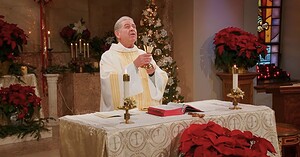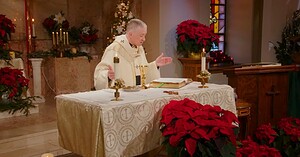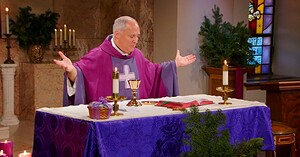Sixth Sunday in Ordinary Time
Homily Video
Sixth Sunday in Ordinary Time Homily Transcript
>> You can choose to follow the commandments, the Lord says Sirach, our first reading. I just real quick, Sirach, is he’s basically an old Jewish guy. He’s writing about the year 175 B.C. He’s a grandfather and he’s writing to his grandson, and he’s giving them all his wisdom. And he’s got a lot of wisdom because there’s like 50 books in the Book of Sirach.
Now, this is after Israel in its history has really, sort of been destroyed again, 175 B.C., it’s well past its prime. It’s been, you know, the Babylonians have come in and the Persians and the Greeks and so forth. Now the Romans are in control. So, what Sirach’s wisdom is not so much, to like the nation of Israel as a whole, not like a macro wisdom, but more to the individual. Because while the nation is gone, there are still Israelites there. There’s still individuals, men and women. And he’s instructing them personally on how to live well. It’s advice that we can take ourselves today. You know, 2,000 plus years later. To choose holiness, to choose to follow God’s commandments.
In the next line, Sirach says, is also to choose to be loyal. So loyalty, obedience, morality. These are things that aren’t just determined by faith. They’re actually sort of up to us with God’s grace.
Now, I think a lot of us can fall into the trap sometimes of thinking, “Well, you know what, I’m just always going to be impatient around, you know, this family member.” Or, “You know, I’m always going to be tempted to, you know, when I’m stressed to eat a whole bunch of sweets.” Or, “You know, when the bears are losing the Super Bowl tonight, I’m going to be really angry. It’s just going to happen.”
Well, no, we can choose whether or not we’re going to give in to the temptation or not. But again, though our wills are weak, we do this with God’s grace. Now, this is why Jesus, when He’s talking about the law, he says, “I’ve not come to abolish the law, but to actually to fulfill it.” So, I’m sure he’s saying this right after the Sermon on the Mount. Early on, in the Gospel of Matthew. And I’m sure a lot of the Israelites, the Jews who are listening to Jesus on the sermon might be like, “All right, this is great. You know, he’s getting rid of the law. Like we can eat pork sandwiches now. We can sleep in on the Sabbath, like no more law.” And, Jesus is like, “Wait. Not so fast. I’m not going to abolish the law. I’m going to fulfill.”
But what’s the fulfillment of the law? What’s the point of the law? All these 670 plus mosaic commands that the Israelites were following. It wasn’t to abstain from the pull pork sandwich in and of itself. The point was to be in relationship with God. Because, you see, the law is something that’s hard to do on our own. It’s really hard, in fact.
You know, even Saint Paul, who was a Pharisee, he lived the law perfectly, still couldn’t do it. It’s why he realizes his system is flawed. We can’t do it on our own. We can’t avoid impatience on our own. We can’t avoid gluttony on our own. But what we do is, if we’re actually living well, we reach out to God.
And so, the difficult law or the difficult moral following puts us in relationship with God because we’re like children. We ask him for his grace to help us along. That’s the fulfillment of law. And that’s why the law is important, because it keeps us in perpetual union with Jesus Christ. That’s where we want to be all the time, not on our own, trying to figure things out, but always walking in sync with our Lord.
So maybe what’s one thing in particular today that you know you personally struggle with a sin and might you invite God into that area of your heart and ask Him for that grace and know that our Lord is very happy to come to you and help you. Amen.
Readings
First Reading:
Sir 15:15-20
Second Reading:
1 Cor 2:6-10
Gospel:
Mt 5:17-37
Featured Text
Discover More
The Holy Family of Jesus, Mary and Joseph
December 28, 2025
The Nativity of the Lord
December 25, 2025
Fourth Sunday of Advent
December 21, 2025
Request Sunday Mass Guide
The Sunday Mass Guide sent to your home address
Spiritual nourishment and updates from the Sunday Mass community
Monthly reflections from Fr. Scott Donahue, our Principal Celebrant


